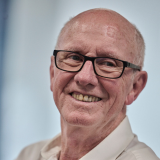Signals ignored: the UK Post Office scandal and the cost of governance silence
A recent webinar on the UK Post Office scandal highlights what boards must do to challenge culture, data and direction.
A Distinguished Fellow of the IoD, Wayne Boyd has been deeply influential in New Zealand’s governance culture.

Late one evening, a cleaner entered an office room where Wayne Boyd DistFInstD, the chairman of what was then Telecom, was working with one of the communications team.
The roar of a vacuum cleaner soon drowned out the high-stakes corporate chinwag. There was an embarrassed request for quiet.
Turning to Boyd, the comms person remarked apologetically: “Sorry about that. I don’t think they know who you are.”
To which Boyd replied: “That’s okay. I don’t know who they are either.”
 After conversations with more than a dozen senior executives, company directors and professional advisers who have worked with Boyd, this single anecdote seemed to sum up one of New Zealand’s most respected and consequential listed company chairs of the past three decades.
After conversations with more than a dozen senior executives, company directors and professional advisers who have worked with Boyd, this single anecdote seemed to sum up one of New Zealand’s most respected and consequential listed company chairs of the past three decades.
Self-effacing and outwardly humble, Boyd was shrewd and uninterested in being the main event.
As he attended the last of so many annual meetings as a listed company director on 1 November, Boyd was completing a career in which he managed to be so unassuming as to be almost completely unknown, except to those who needed to know him.
Yet this is the man who replaced Roderick Deane as chair of Telecom, oversaw the departure of its first chief executive, Theresa Gattung, wore the flak for hiring Scotsman Paul Reynolds on a staggering-for-the-time $5 million-plus annual salary, and brought Saatchi & Saatchi head Kevin Roberts onto the board.
Having done so, he then saw through the operational and the physical separation of Telecom into the companies that were to become Spark and Chorus.
He also helped to privatise Auckland International Airport and to get Meridian Energy floated on the NZX, chaired Freightways and Ngāi Tahu Holdings and was at one of the early incarnations of the district health boards, Capital & Coast Health.
He helped reform the New Zealand Blood Service and was involved at the highest levels in amateur and elite sports.
His favourite directorship, at Vulcan Steel, was his longest and his last, with that 1 November annual meeting ending a 23-year tenure with a company whose unique, family business and employee engagement culture was a bellwether.
Yet, in all that time, it seems Boyd only ever gave one interview, over a decade ago, where his main comment was he was looking forward to retirement.
It was a long time coming, but now that it has happened, Boyd let long-time fan and adviser, PwC partner Carl Blanchard, twist his arm into sitting down with BusinessDesk for a two-hour ramble through an unsung career.
As Blanchard said in a valedictory speech from the floor of the Vulcan annual meeting: “Wayne has never been one for the spotlight, but over his 30-year career he set the standard and professionalised corporate governance in New Zealand.”
He was “never part of the so-called governance club”, said Blanchard. As if to prove the point, Boyd’s central Auckland digs are a stone’s throw from that bastion of the establishment Northern Club, but he’s never joined.
An internet search suggests that Wayne Boyd has served on the boards of about 167 entities. Granted, many were subsidiaries of a larger name, but the roll call gives a flavour of his reach.
On top of the chairmanships already mentioned, there were directorships at Chorus, Vector, Forsyth Barr, the Halberg Foundation, the NZ Hockey Federation, Sport and Recreation NZ and Allflex.
That’s just a sample.
The hockey connection is important. That’s where his corporate leadership ambitions began.
Having been “parachuted in” to coach the women’s team at the 1984 Olympics in Los Angeles, where New Zealand came sixth out of six, he went on to coach New Zealand at the Women’s World Cup that year in the Netherlands, where the team came fourth, beating the United States but not the Soviet Union, according to the records.
Having moved after high school in Whanganui to Auckland for law school, Boyd had washed up as a corporate lawyer in Hamilton, but it was beginning to pall.
“I came back from there [the Women’s World Cup] thinking: ‘Do I really want to be a lawyer for life?’”
The answer was no.
So he badgered sports administrator and Bancorp chairman John Wells for a job in merchant banking. Wells took him on just in time for the 1987 share market crash.
“But the beauty out of that was, there came a lot of work with corporates whose balance sheets didn’t actually reflect what they claimed, and banks had a lack of documentation around a lot of their lending at that time.”
The resulting “frenzy” caused a certain levelling of the playing field. A low-key former Hamilton lawyer could enjoy something a lot closer to equal status with newly humbled pre-crash high-fliers.
“I had a lot of dealings with CEOs – some good, some bad – CFOs, bankers.”
He recalls a phone call on the way to a meeting in Adelaide to help sell an asset that a Swiss client confidently believed to exist, to say that it was simply “no longer there”.
It was all rather exciting.
“I realised I really liked working with these people, being part of the decision-making and the desire to actually be better than they were; that I could have a really good career where I could make a contribution.”
However, Boyd’s natural humility did not equate to an absence of self-worth.
“I remember telling a headhunter: ‘No, no. I’m not interested in an executive job. I’m going to be a full-time director’. He told me later he went back to his office and said: ‘That guy’s got rocks in his head’.”
Turns out the headhunter was wrong.
By the early 1990s, Boyd found himself pulled by then New Zealand Māori Council Chair Graham Latimer into the negotiations for what would become one of the first big Treaty of Waitangi settlements – the so-called ‘Sealord’ fisheries deal.
In a roomful of advisers in Auckland with Latimer, Boyd was struck by the absence of direct contact between Latimer and the other kingpin Māori figure in that negotiation: Ngāi Tahu’s Tipene O’Regan in Christchurch.
“I said to him: ‘I don’t think you’ll get agreement unless you go down and see Tipene. Unless you talk together away from all these advisers, I’m not sure you’re going to make any advancement’.”
Latimer turned to him and said: “Do you have any idea what you’re asking me to do?”
But Latimer did it. The talks were crucial to the settlement occurring and O’Regan started tapping Boyd for advice.
Once again, Boyd expressed a preference for governance over consultancy.
“I was on a bus looking at some of the assets they had in mind and I said: ‘Look, I might be better being on the board rather having to pay me’. I was just interested in what they were trying to do and how difficult it was.”
It wasn’t all plain sailing. At a chilly hui with about 1,000 iwi members at Colac Bay, in deepest Southland, Boyd found people “not quite confrontational, but searching in their questions”.
“That was probably an experience that set me up quite well for public company meetings,” where Boyd always made a point of talking to shareholders before a meeting starts, their feedback an essential part of his intelligence-gathering as chair.
“You’ve got to live it.”
Institutional shareholders, either existing or prospective, also got a new kind of treatment.
In the case of the 1998 sale of Auckland International Airport in a public share float, “I understood this was a government selling an asset owned by the people of New Zealand and we were having to sell this to the world”.
Boyd led a global “exhausting” international roadshow involving “260-odd meetings”.
It was to be the genesis of an approach to investor relations that may seem commonplace now among large, listed New Zealand companies but was far from the norm 30 years ago.
Key to his approach was his belief that it was important for the chair to represent the company. It could initially be uncomfortable for senior executives, who had assumed that role in the past, but investors liked it.
“Some of the people that we saw would look at the chief executive, look at me, and say to the chief executive: ‘You could wait outside the door’.
“They were interested in the governance side and maybe the softer side of the organisation, and that stood me in good stead.”
It was particularly useful when US hedge fund manager Elliott International bought into Telecom in 2008, convinced that the company would be more valuable if it were broken up. Elliott was promoting two new directors – Mark Cross and Mark Tume.
Boyd wasn’t keen.
“So, I was on the front foot saying ‘no’ to all the institutional shareholders, telling them they had to rely on the board that we’re developing to get through this, and we don’t need a shareholder of that sort being represented on the board, and so they [the Elliott nominees] didn’t get on.”
“That was quite a lot of work,” he mused before dispensing wide-ranging thoughts on what he’d learned in a long career.
Special offer for IoD members
As an Institute of Directors member you can get an exclusive deal on a BusinessDesk subscription - $150 for the first year - by using the code IOD2025 and competing your details here.
T&Cs apply: Offer available for a limited time and not available via app. $150 for the first year, then $349 per year. Auto renews until cancelled.